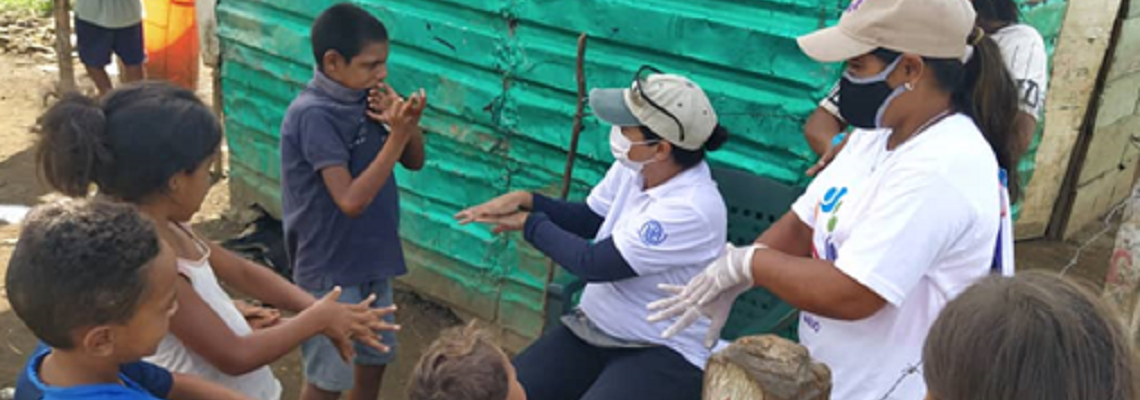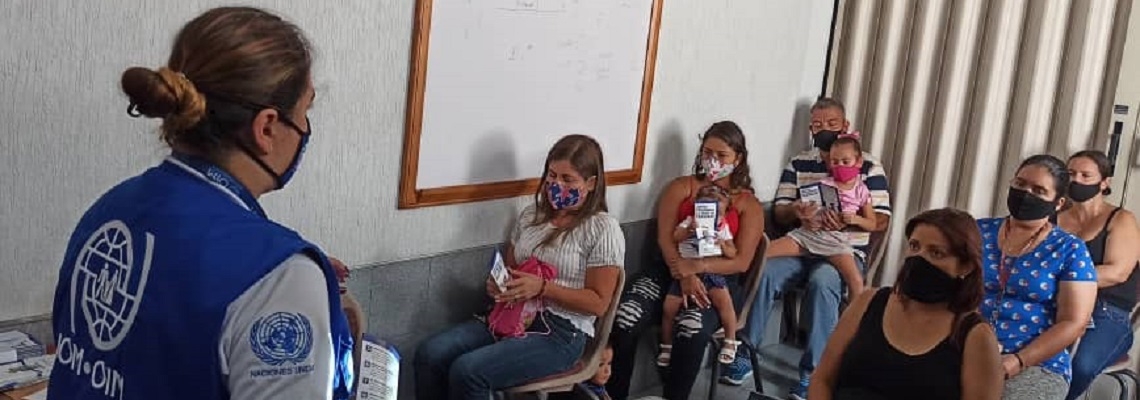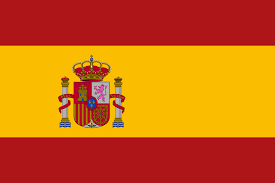IOM Vision
IOM will continue to provide assistance and early- recovery and resilience programmes in Venezuela for vulnerable migrants and displaced populations, affected by the complex crisis of Colombia and Venezuela, as well as for the communities which host them. IOM’s multi-sectoral programming will respond to the needs and priorities of affected populations, leveraging IOM's operational presence, technical expertise and strong relationships with national and local authorities to limit the humanitarian and socioeconomic effects of the pandemic and support affected communities in their recovery.
Objective
Saving lives and protecting people on the move
Vulnerable people and crisis/displacement affected communities in need, with a particular focus on women, girls, the elderly, LGBTI people, people living with HIV/AIDS, victims of gender-based violence/trafficking in persons/smuggling of migrants and people with disabilities are targeted by IOM in Venezuela. Due to the limited access to basic services for indigenous communities and Colombian refugees, IOM will also ensure that they are reached through life-saving assistance in several sectors. In response to COVID-19, frontline health centers and institutions will benefit from IOM activities.
In order to support the creation of an environment in which all forms of violence, including, but not limited to, extortion, abuse, exploitation, human trafficking and gender-based violence and abuses against human dignity of crisis-affected populations are identified, responded to and prevented, IOM activities will include:
- Establish and manage safe spaces for women and girls in communities with high rates of reported protection incidents and risks, in order to re-build their social networks, receive social support, acquire contextually relevant skills, and receive information on issues relating to women’s rights, health, and services;
- Provide access to safe specialized multi-sectoral case management services, including mental health and psychosocial support (MHPSS), to gender-based violence (GBV) survivors, victims of trafficking (VoT) and any other form of exploitation and/or abuse in safe spaces, including to children and adolescents;
- Strengthen screening and reporting mechanisms and improve referral routes between partner agencies and organizations to ensure a coordinated and coherent response. This includes mapping of the available protection services, providing specialized care, specifically health, MHPSS services, and legal services;
- Enhance protection services of state and non-state institutions in Venezuela to prevent and respond to gender-based violence, transnational human trafficking, and child protection challenges encountered;
- Strengthen the capacities of community leaders in identifying risks and facilitating access to services by providing information on available services, and of other GBV front line actors, including local non-governmental organizations (NGOs) and government actors providing specialized GBV services, including health, psychosocial support and safe shelters. Such actors will be trained through selected implementing partners;
- Facilitate access to documentation and life-saving information to vulnerable populations, including children, disseminate life-saving information related to protection risks and its mitigation in transit and temporary accommodation centres, as well as in communities. Messaging will be developed by specialists and include information on GBV risk mitigation, trafficking and smuggling, sexual and labour exploitation and other forms of abuse, updated information on available services and ways to mitigate risks;
- Provide information and orientation on access to documentation in the country to vulnerable Venezuelans;
- Development of ad-hoc software where needed for NGOs and local government institutions to create paths to documentation and case management and provision of IT equipment to improve registration of migrant and refugee children and support access to civil documentation;
- Promote the design and use of a unified tool and common criteria for data collection that includes information disaggregated by gender, age, and diversity and type of vulnerability. Share results with the Humanitarian Country Team and the inter-cluster communication group, to facilitate decision-making and coordinate protection activities;
- Establish a safer environment in local communities through sensitization campaigns on GBV risk mitigation, trafficking, and other forms of exploitation and abuse in areas of origin and transit in order to reach out to groups of different age, gender, and vulnerabilities.
All activities will be conducted in consultation and collaboration with communities and IOM will ensure meaningful participation of vulnerable groups especially women and girls, children, persons with disabilities, or any other group that might be more vulnerable. Moreover, IOM will ensure adequate gender balance in teams. All staff members will be trained in order to have basic knowledge on GBV and know how to respond to a disclosure of an incident and refer safely and ethically.
With regards to health support services, IOM will carry out the following activities:
- Providing prevention and primary health care for people on the move, returnees and isolated, displaced and vulnerable groups through mobile health teams (MHT), composed of general practitioners, paediatricians, OB/GYNs, psychologists, nurses and health promotors, providing a wide range of diagnostic and treatment services;
- Mapping specialized health and other service providers and ensure inter-agency coordination and complementarity with work undertaken by host government counterparts, civil society, and international actors;
- Establishing referral pathways to ensure as much as possible a comprehensive and complete medical service, that will include out and back referral and creation of a referral register to maintain a list of all outward and inward referrals;
- Deploying medical teams to conduct health days in temporary accommodation centres in border states Apure, Zulia, Barinas, Amazonas, Táchira and Bolívar states, which host most returnees and migrants within Venezuela to facilitate their access to primary health services. Health checks and primary assistance for people on the move, if required, will be provided by at least one doctor and one nurse who will be provided with basic equipment and medication;
- Deploying trained CHWs to conduct health promotion activities to provide necessary information to community members about how to improve health outcomes, prevent STIs, vector-borne diseases, food and water-borne diseases, among others, through trained CHWs, mobilize communities and the promote the work of MHTs, follow up and help community members understand their health condition(s) and develop strategies to improve their health and wellbeing.
- Engaging CHWs in community-based surveillance responsibilities, limited to systematic continuous collection of data on events and diseases using simplified case definitions and forms and reporting to mobile health teams for verification, investigation, collation, analysis and response as necessary, with timely and regular notification of the MHTs of the occurrence of unexpected or unusual cases of disease or death in humans and animals for immediate verification and investigation and support during the case/outbreak investigation and contact tracing;
To support mental health and psychosocial support for affected populations, IOM will conduct the following activities:
- Provide mental health and psychosocial support (MHPSS) services to vulnerable people and communities, both at the community and individual level. This includes the provision of individual and group counselling, provision of psychological first aid (PFA), community and family support activities (such as sociorelational activities, including sport and play activities, art-based activities and cultural events).
In order to strengthen access to water, sanitation and hygiene (WASH) and increase capacities of vulnerable communities in Venezuela to prevent diseases contagion, especially COVID-19, IOM activities will include:
- Improvement of access to safe, sustainable WASH services for vulnerable people through rehabilitation of water and sanitation infrastructure and provision of hygiene promotion activities, ensuring that the assistance meets minimum Sphere standards in 1) vulnerable communities, 2) temporary accommodation centres, 3) health institutions, and 4) schools, where WASH services are below minimum standard;
- Distribution of hygiene kits to the vulnerable population, people on the move and returnees, including menstrual hygiene management (MHM) kits, paying special attention to the needs of women and girls in reproductive ages. Hygiene kits contain items such as toothbrushes, toothpaste, toilet paper, deodorant, litter bags and water purification tablets, as well as specific items for the infection prevention and control (IPC) of COVID-19 such as antibacterial gel, latex gloves, masks, and extra soapIOM WASH teams will work alongside IOM health teams to conduct awareness-raising sessions on health and hygiene promotion, including menstrual hygiene management and COVID-19 prevention measures;
- Delivery of cleaning and disinfection materials to support IPC for COVID-19 at institutions such as health centres, schools and temporary accommodation centres, including detergent, cleaning items, chlorine-releasing products, chlorine measurement equipment (such as pool tester strips), dark plastic containers for solution preparation and personal protective equipment (PPE) (face shield, goggles, long sleeves, gloves, boots) in line with IOM’s WASH Technical Guidance in Disease Outbreak - Disinfection;
- Provision of training on the proper use of hygiene items that require some technical knowledge such as use of water purification tablets, and cleaning and disinfection items such as chlorine will be provided with appropriate training to ensure health and safety of beneficiaries;
- Strengthening of communities’ hygiene behaviour through hygiene promotion activities, including posters, focus-group discussions, awareness campaigns and dissemination of information, education and communication (IEC) materials in targeted areas.
In order to meet the shelter and non-food item (NFI) needs and improve the living conditions of the affected population, IOM activities will include:
- Strengthening and expansion of IOM's network of mobile assistance points on migratory routes for migrants and returnees, in coordination with local authorities;
- Conducting needs assessments and providing essential NFIs (habitat kits, infancy kits, hygiene kits and dignity kits, PPE kits) to the most vulnerable households, people with special needs and other vulnerable groups, in prioritized communities and to people on the move;
- Planning and designing of frameworks and standard operating procedures (SOPs) for the establishment of common warehousing, common pipeline services and related transportation logistics in the states of Amazonas, Apure, Bolivar, Táchira, and Zulia in coordination with the relevant Clusters to offer services to the humanitarian actors operational in the areas;
- Distributing NFIs (hygiene kits and dignity kits), PPE, and shelter kits through local partners in Amazonas, Apure, Barinas, Bolivar, Caracas, Falcón, Sucre, Táchira, and Zulia, and other identified vulnerable communities including returnees, including identification and distribution of articles that specifically address women’s and girls’ needs;
- Post-distribution monitoring (PDM) for NFI distribution and service delivery;
- Mapping and ensuring coordination and complementarity with work undertaken by host government counterparts, civil society, and international actors;
To support the fulfilment of basic needs of affected populations, IOM will:
- Provide monthly food kits to vulnerable communities, migrants and returnees, to promote livelihood recovery and resilience of the most vulnerable populations in areas of origin and destination of human mobility in Venezuela, containing unprepared food items that support 60 per cent of household´s monthly food needs. The composition of the kits will be in line with food security cluster recommendations and adjusted to the local diet.
In order to support the management and effective operation of the network of temporary collective shelters for people on the move, IOM activities will include:
- Providing safe access to goods and essential services to people on the move, including vulnerable populations in temporary collective shelters for migrants;
- Coordinating with the relevant implementing partners (IPs) the provision of services at temporary collective shelters, including accommodation provision, access to food, sanitation facilities, access to life-saving information;
- Supporting the improvement of the physical infrastructures of temporary collective shelters, prioritizing water and sanitation, and providing equipment to achieve SPHERE minimum standards;
- Strengthening the capacity of local IPs who manage temporary collective shelters and provide services, through the provision of trainings on shelter management and minimum standards, protection mainstreaming, prevention of sexual exploitation and abuse (PSEA) and humanitarian standards, among others;
- Supporting the adoption of a protocol on prevention measures for COVID-19 transmission at temporary collective shelters including social distancing, mask wearing, hand-washing or disinfection, activities implemented with a small number of participants and antigen tests will be provided in case they are required.

Objective
Driving solutions to displacement
Vulnerable people within crisis/displaced communities in need, with a particular focus on women, girls, the elderly, people living with HIV/AIDS and people with disabilities, who respond to the minimum requirements in order to carry out specific livelihood projects. The requirements depend on the type of activities and can include ownership of a piece of land, access to water, reading capacities and motivation). Colombian refugees in need of (re)integration assistance will also benefit of livelihood support. In addition, IOM will support migration local entities and relevant local stakeholders to increase their capacity to provide essential services to migrants and vulnerable populations and lay the foundations for durable solutions, lasting peace and sustainable development.
Community stabilization aims to support governments, states and communities undergoing significant socioeconomic and political changes during and following a crisis, in order to (re)establish stability and security, prevent further forced migration, restore trust among community members, vulnerable populations and local authorities and lay the foundations for durable solutions, lasting peace and sustainable development. Under this component, IOM aims to tackle the root causes of migration by promoting stability and integration in communities of origin and destination of vulnerable human mobility. IOM activities will include:
- Implementation of community food security projects, to promote sustainable local food production, self-sufficiency and healthy diets. The activity aims to both enhance social cohesion and integration between people on the move and host communities and decrease the number of households that adopt negative coping mechanisms such as skipping meals due to scarcity of food. For this activity, IOM provides seed and tool kits, technical capacity building and monitoring to returnees and vulnerable families in host communities or vulnerable indigenous communities. Good practices include the development of local seed banks in cooperation with the Food and Agriculture Organization (FAO);
- Preparation of school meals in host communities, areas of transit and the most vulnerable communities with a high number of people leaving. Through the provision of daily meals, IOM seeks to improve school inclusion and retention rates for the most vulnerable children, while enhancing levels of food security and nutrition;
- Implementation of activities promoting the migration-development nexus including strengthening of the heath sector and increasing the capacities of migration local authorities;
- Engagement with and capacity building of local administrations to lead inclusive participatory planning process in partnership with IOM and civil society;
- Development of community action plans for stability and recovery, including assessment of the state of local medical, educational, and other critical public infrastructure;
- Provision of technical and financial support for priority areas, through in-kind grants including but not limited to restoration of health services, public infrastructure, economic infrastructure, and communal spaces;
- Assessment of the state of individual local infrastructure and support of maintenance, recovery and/or upgrading conditions of medical, educational, and other critical infrastructures;
- Mapping of relevant actors and ensure inter-agency coordination and complementarity with work undertaken by host government counterparts, civil society, and international actors;
- Refurbishment of official border crossings infrastructure to enable better humanitarian services and working conditions;
- Support to connectivity and communications in isolated areas to facilitate access to internet for migrants so that they can keep their families updated on their journey.
To promote MHPSS as part of recovery and crisis prevention, IOM will:
- Support of community-based sociorelational activities that will restore social cohesion and the inclusion of marginalized groups such as sporting activities, cultural events, civic dialogues and strategic communication.
To support increased capacity and strengthening of the health system in Venezuela, IOM will implement the following activities:
- Providing medical equipment, supplies and medicines in primary health facilities in selected communities in the states of Bolivar and Amazonas;
- Enhancing the capacities of community health workers (CHWs) in order to strengthen their knowledge on health-related issues of vulnerable populations through refresher trainings on health promotion topics such as menstrual hygiene management, prevention of communicable diseases, and so on in coordination with the WASH sector activities;
- Health system strengthening through helping to retain medical professional staff at hospitals, capacity strengthening of “Medicos Integrales Comunitarios” through theoretical and practical workshops, as well as rehabilitation and provision of equipment in order to improve medical services;
- Rehabilitating and providing equipment and supplies for health centres in border areas to increase sustainable access to health services for migrants, returnees and vulnerable communities.
Objective
Contribute to an evidence-based and efficient crisis response system
Entities targeted include relevant stakeholders, including governments, institutions, working groups such as the Humanitarian Country Team, Information Management Working Groups, Field Coordination Group, Interagency Coordination Groups, donors, UN agencies and forums, and humanitarian and development actors in Venezuela and in the region that will make use of Mobility Tracking Matrix (MTM) products and the data collected through assessments to inform the multisector response and allow for prioritization.
To obtain data on the migration flows and address the information needs of the overall humanitarian response in Venezuela, IOM activities will include:
- Monitoring and trend analysis of migrant flows at border crossings through data collection and the delivery of humanitarian communication services;
- Implementing humanitarian needs assessments at communities of origin;
- Undertaking statistically significant surveys to develop profiles of migrants in transit, returning migrants, displaced populations, and potential migrants;
- Analysing remittance flows and make recommendations to lower the cost of transactions in line with Sustainable Development Goal 10;
- Advocating with state actors to reach a common understanding on the recognition of the Venezuelan migration situation and the establishment of a national registry in coordination with both government and non-government partners;
- Inclusion of health related variables to identify gaps in COVID-19 vaccinations and disease surveillance.
Data will be collected through multiple methodologies (registration, key informant interviews, individual and household surveys, secondary information, etc.) both in urban and rural areas and aggregated to the state level. Information products will include maps, dashboards, narrative reports and raw data, which will be shared with humanitarian partners on a regular basis.
Venezuela (Bolivarian Republic of)
The map used here is for illustration purposes only. Names and boundaries do not imply official endorsement or acceptance by IOM.
Figures are as of 31 December 2023. For more details of IOM's operational capacity in country, please see the IOM Capacity section.














